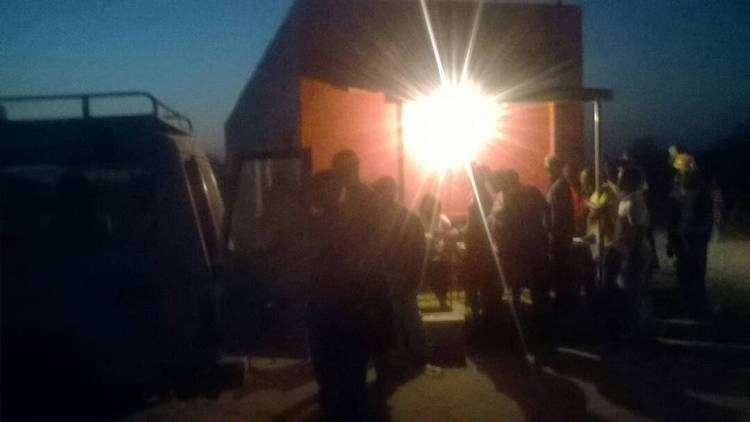
The Sunday Mail

Emmanuel Kafe
Under the simmering heat of this part of the world, the road winds up and down, turning into sudden hairpin curves before breaking into mopane flat land.
And here, a road insignia screams, Beitbridge Border Post!
There is a lot of noise.
A blizzard of static as the night envelopes the Matabeleland South province.
It is here, that ladies of all types – short, stout or tall, light or dark, onion-shaped or pencil-slim dabble in the world’s oldest profession, commercial sex work.
More often than not, when a haulage truck huffs and puffs, hobbling to a grinding halt, bizarre and unthinkable things happen.
Something is hitching a ride here. Something deadly.
And it’s almost as easy to unload as one of the truck’s containers.
Its presence is felt in this small developing border town here, where semi-trailers linger here and there, waiting for their cue to move on.
For this particular group of people, it is business as usual.
A recent media tour with the National Aids Council last week to this province and the Beitbridge town in particular, saw women as young as 15-years-old trading their bodies for goods or money from truck drivers.
Services like cooking and laundry for truck drivers are offered for free; you only part with between US$1 and US$5 to extend the services to those of a sexual variety.
“They are our maids by day and wives at night as we wait for border clearance here. Some even offer free services like tidying and cooking, some end up having an affairs with these women,” said Farai Gombedza, a cross-border driver as he conversed with this writer.
It is no great wonder that the province’s HIV prevalence rate is about 22 percent, one of the highest in Zimbabwe. Mr Prosper Mupa, the NAC acting provincial manager who doubles as the monitoring and evaluation officer, said: “According to the Zimbabwe Demographic and Health Survey of 2015, children in Matabeleland province have HIV prevalence rate in children of 2,2 percent with adults having a rate of 21,5 percent.
He added that major contributers of such rates were spousal separation, low and inconsistent condom use, low risk perception and inter-generational sex.
Famous for its hot temperatures and a high rate of HIV prevalence, Beitbridge has seen several intervention projects to stop the world oldest profession trickle down and to counter the spread of HIV and Aids, cancer and STIs.
The National Aids Council and partner organisations have projects aimed at reducing the levels of the vice that significantly contributes to the spread of HIV and Aids.
Projects targeting hard-to-reach areas, the youths and those who don’t feel comfortable availing themselves at hospitals and public clinics for HIV or STIs testing because of the stigma that comes with such ailments. Of these projects are moonlight clinics, roadside interventions and musical gala’s which so far have yielded positive results.
However, moonlight clinics stand out of all the projects as it draws a lot of people. Moonlight clinics are mobile clinic that allows an individual to nicodemously sought the services of nurses at night without anyone noticing.
These clinics are strategically positioned at hotspot areas to allow people to visit them secretly. There, they offer HIV testing, cancer screening and circumcision.
Community members confided to this publication that the programme is a welcome move as youths who would in the past suffer in silence from STIs because of the stigma can now get services freely at these clinics.
“Most of our children do not want to visit clinics and hospitals in broad day light for treatment of HIV and STIs,” said a man who only identified himself as Chagwada.
Mr Mupa said moonlight clinics are organised once or twice a year in Beitbridge especially in seasons were the community organise events like cattle auctions.
“There is a cattle auction that takes place every year in the district were people from all walks come and enjoy as there will be musical galas after the auction. At such events commercial sex workers come in their numbers hence an opportunity for us to give them testing services,” he said.
The cattle auctions draw more than 1 000 people from across Matabeleland South.
Apart from cattle sale events, night clinics are done at strategic places such as truck-stops, night clubs or during musical shows, specifically targeting commercial sex workers and their clients.
The latest moonlight intervention of their second quarter of 2017 which was conducted at Esigodini Night Spot in Jabula saw people responding to HIV testing and according to Mr Mupa, about 15 percent people who were tested, returned positive.
National Aids Council said the interventions have yielded results as there has been a decrease in the number of STIs infection in the district.
During the first quarter of 2017 the district had the highest number of STIs with 12 669 people infected with STIs, which has dramatically decreased to 1 023 after the introduction of moonlight clinics and road-side interventions.
The sharp decrease is attributed to the comprehensive HIV and Aids education, condom distribution and condom use. Apart from moonlight interventions, NAC realised that a proportion of the trucking community are effectively transporting HIV across Africa, with Zimbabwe the nexus of the epidemic, hence they introduced roadside intervention.
“To date we have provided services to more than 3 000 people through roadside intervention,” said Mr Mupa.
Beyond the reach of health systems, people on the move, like truck drivers and sex workers, are more vulnerable to illness and play a pivotal role in transmitting disease between communities across borders. According to the latest statistics from the Ministry of Health and Child Care, the Matabeleland province has the highest HIV prevalence rates in the country with Matebeleland South remaining the hotspot for HIV and Aids after recording the highest HIV prevalence rate for 2016.






